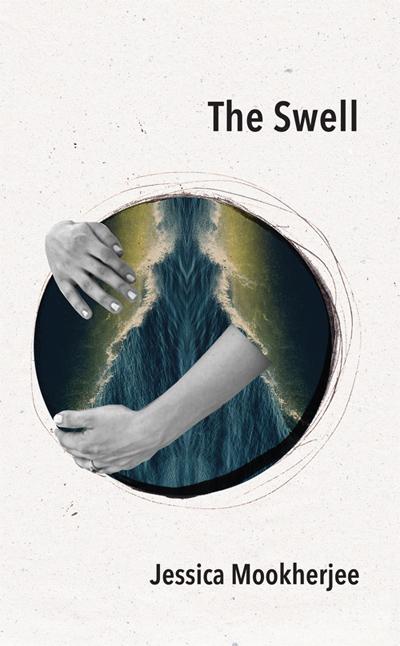Writing in 1989, scholar Werner Sollors caused a bit of a stir when he challenged the concept of ethnicity as a hermetic, immutable category. Sollors describes ethnic groups as existing within history and as highly unstable and pliable entities which are constantly interacting and redefining themselves. Indeed, he adds, in today’s global context it is difficult to characterize a writer as belonging exclusively to one ethnic group.[1] For Sollors, ethnicity is not essence but rather as a dynamic historical process though which we define and redefine our identification with one or more groups.
For this reason, it would be wrong for critics to pigeonhole Jessica Mookherjee as ‘ethnic’ writer. She is much more than that, and her poetry is elegant and evocative. Her background is Bengali, and she grew up in Wales; she now lives in the Southeast. Swell, a pamphlet of 15 poems published in 2016, is her debut. In it, she skillfully and sensitively evokes the rich cultural and personal strands that run through her life.
Several of the poems focus on the complexities of family. The title poem, ‘Swell,’ evokes a pregnant woman, ‘drum-tight and ‘about to burst,’ with a husband who ‘made a fuss of her for a change.’ Another poem, ‘Snapshot,’ begins with the lines
There is photographic evidence
of when she shifted her gaze,
the exact time her eyes went out of focus.
and goes on to describe pictures of the poet as
…growing bigger
in pigtails, often alone.
A snap of a girl with her hand on her mother’s
shoulder, like a Victorian husband.’
With elegance and understated economy of expression, Mookherjee paints in remarkably few words a haunting picture of her mother’s vulnerability and her own isolation.
Another poem, ‘Glass Sisters,’ describes pottery images in a glass cabinet. The first person plural perspective is deftly deployed; the ‘we’ may be that of the objects
We were all cabinet curios,
waking occasionally , trapped behind glass
under small locks, tiny keys.
or of child who identifies with them:
Gingerly, with a smell of fresh rose water
she would take us out, sit us on the sofa,
while she played with a typewriter,
practicing her name. No one but us
saw her hair unbraided,
cascades of shining black.
Her fingers spelling yours sincerely
Clicking on the white Olympus—
I could get a job, learn to drive, drink wine
she muttered, glancing at her dolls.
The child exchanges a glance of complicity with Kuan-Yin:
I looked sideways at Kuan-Yin
behind her pane; she smiled at me
and listened to the world’s sorrows.
In ‘Red,’ Mookherjee gives us a subtle cascade of images: red curtains in her mother’s house ‘…like blood dripping down the windows’; a red tikka on her mother’s forehead ‘looked like someone had shot her’; red lipstick ‘inappropriate for a girl of six’; a red silk skirt that made a lover smile; that same lover’s face ‘…too red, too much sun, too much/beer, too much butter; an unflattering red shirt that ‘doesn’t flatter.’ The poem ends with two lines evoking the visceral barrenness of the failing relationship: ‘there’s blood in the bathroom again/this month.’
The final poem in the pamphlet, ‘The Changing,’ is marvelously surreal. It describes a woman transformed into a fish:
At night she dives into wet corridors
Seeps from blankets,
Slathers across carpet, lost in the heft;
She’s flatfish slapping down stairs
Leaving trails of silver moon-strike.
In night that tastes of felt, she gulps air
Chokes on magnolia walls. Her eyes bulge
And sight blurs.
The poem ends with a stunning vision of liberation:
…she reconstitutes in ripples
and, at last, she is night swimming,
free of her fins
in the swell of stars, arms stretched in a
yearning dance of encore.
The deft enjambment that runs through the poem, and the marvelous vividness of the verbs (‘dives,’ ‘slathers’, ‘gulps’, ‘chokes,’ ‘bulge,’ ‘blurs’) create a vision of almost unbearable intensity.
The apparent surface simplicity and elegance of Jessica Mookherjee’s carefully crafted poems conceal a hidden depth charge of emotion and sensibility. The reader is left wanting to read many more, and her forthcoming collection is eagerly anticipated.
[1] Werner Sollors, The Invention of Ethnicity (Oxford University Press: 1989)
Order your copy of Jessica Mookherjee’s The Swell (Telltale Press, 2016) here: http://telltalepress.co.uk/about/jessica-mookherjee/

